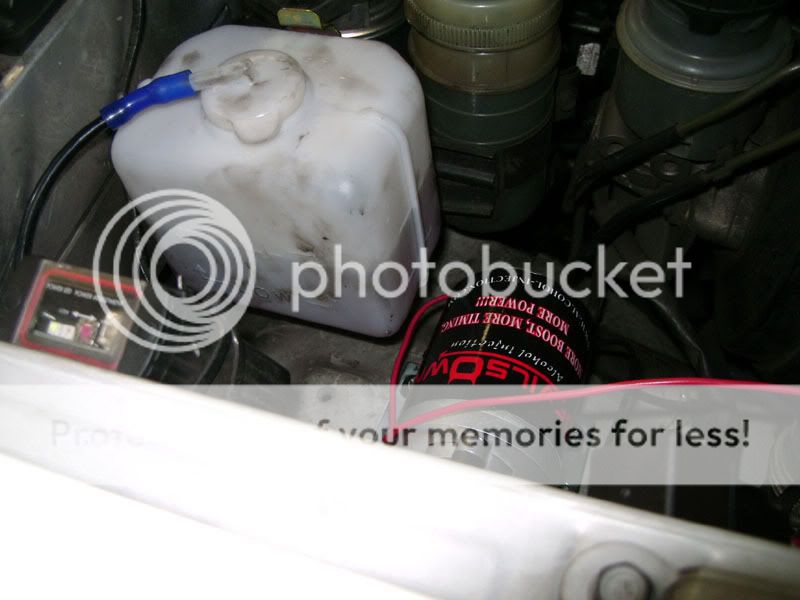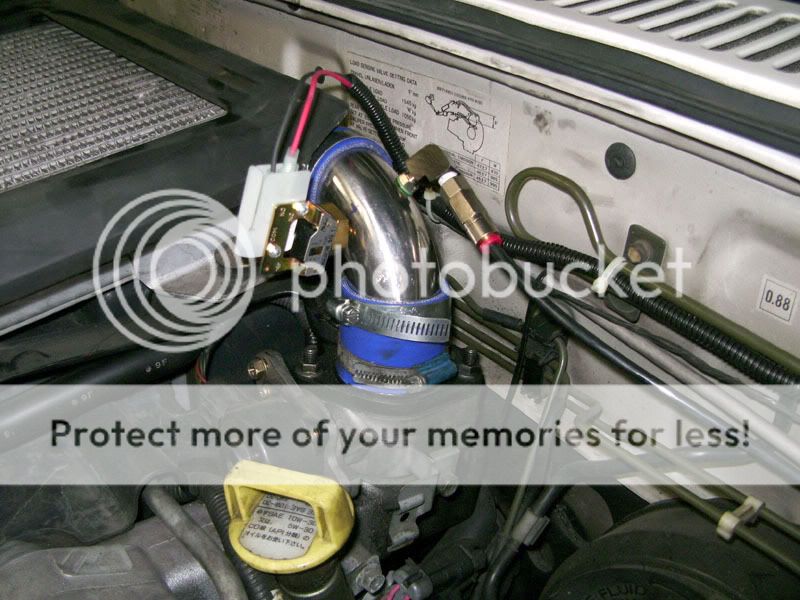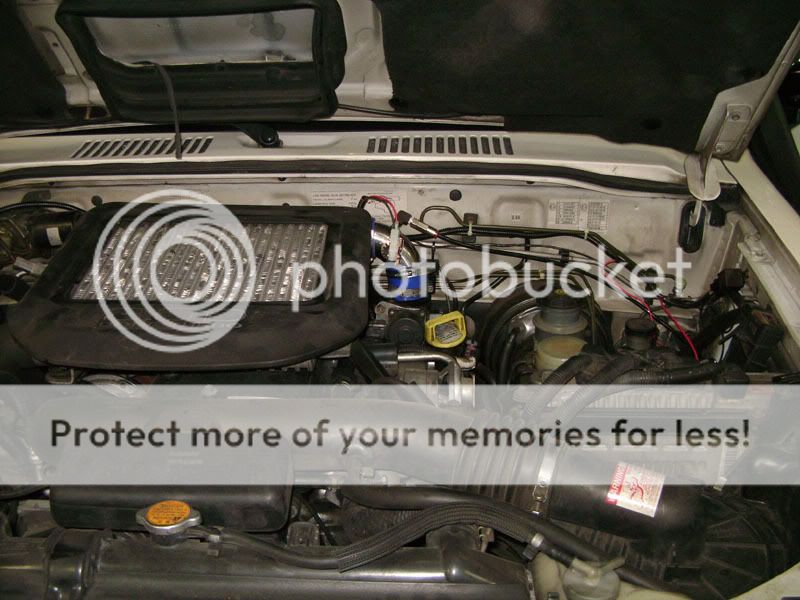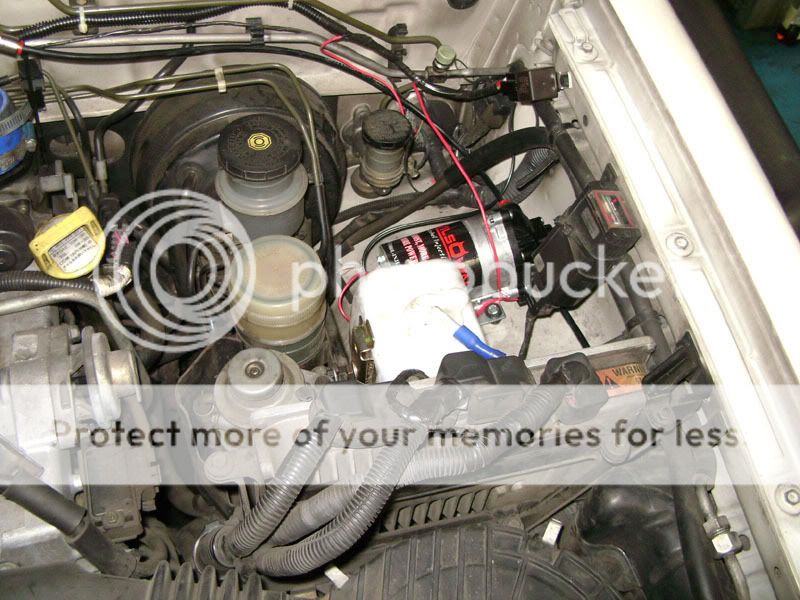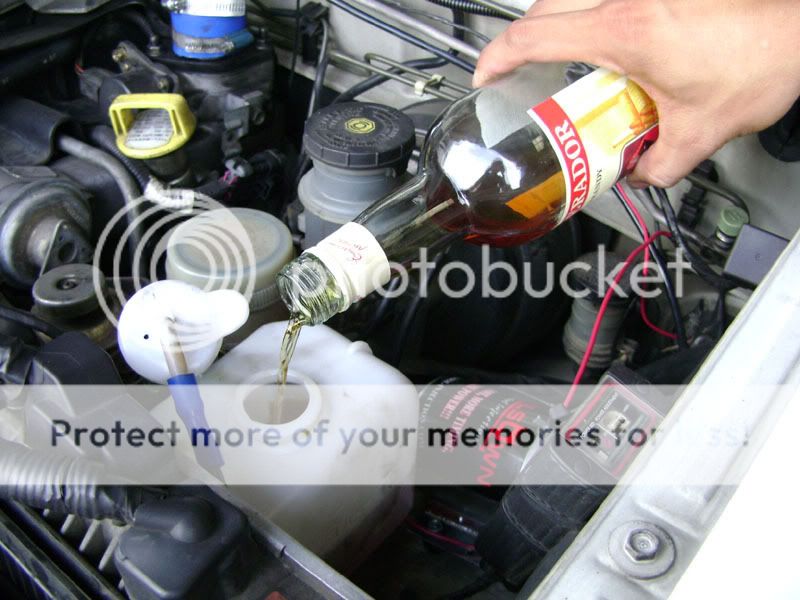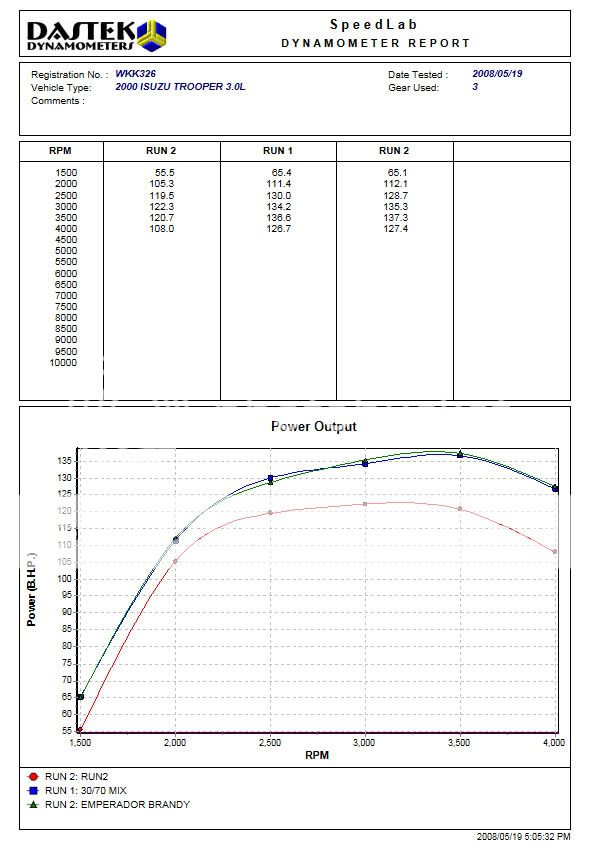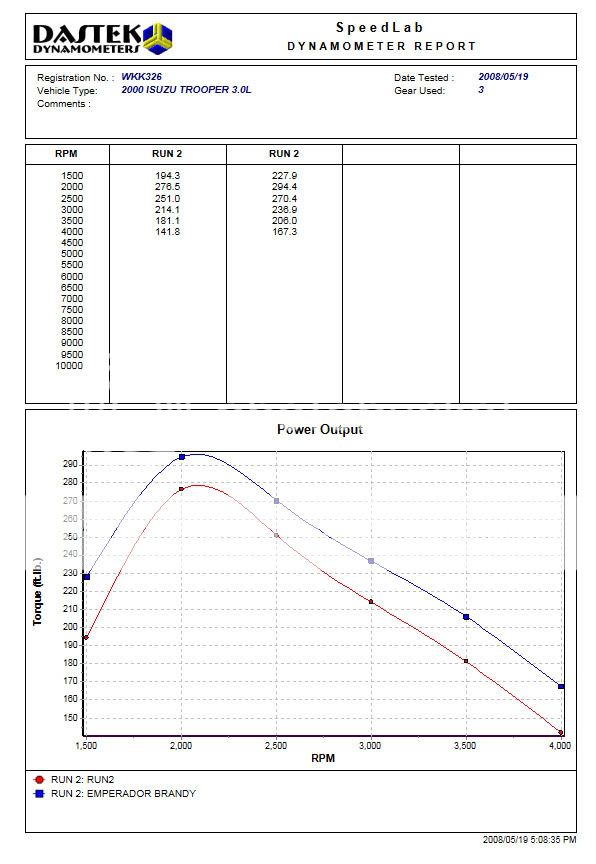For those who are not aware of the benefits here it is in a nutshell.
• How does alcohol/water injection work?
By injecting a fine spray of alcohol/water into the inlet air stream of the engine, the charge air is dramatically cooled and the effective octane of the fuel is raised. Both help to eliminate detonation — the enemy of any engine, especially those using today's lower octane fuel under boost. For turbo diesel engine you will get a 100% fuel burn and on average pick up 20% to 30% more horse power over your RPM band. Turbocharged Gas engines will on average pick up 20% more horse power. You will notice immediate gains in performance. Your turbo will spool up faster, your top end will be noticeably improved and you will get no detonation.
What are the other benefits of alcohol injection?
1. Steam cleaned motor, alcohol injection will remove 95% of all carbon on the inside of your engine and keep it that way dramatic increase in engine life. There is no fuel additive on the market that can clean your engine as well. This means less maintaince , were talking almost zero carbon build up on plugs combustion chambers and valves!
2. Eliminate black smoke in turbo diesels by 95% under load.
3. Reduce emissions making a marked improvement in air quality.
4. More Kilometers per liter, more power at less throttle equal more liters per Kilometer.
5. Zero detonation
6. Intake air temperature reductions of up to 37C drop. You touch your intake it will be ice cold even on the hottest day after the system is on.
7. Reduction of Exhaust gas Temperatures as much as 93C, which increases horsepower and eliminates detonation especially on chipped vehicles with increased timming and boost.
Common question will injecting water/alcohol into my motor harm it, This is a complete myth water is produced in the combustion process in rather large amounts already. Methanol or whatever alcohol you choice to use is in vapor form inside the engine due to it's low boiling point. On diesels you can only go a max of 50/50 on the water/alcohol mix.
A alcohol/water injected motor will be free of about 95% of carbon buildup and stay that way as long as your using it.
Fact about water production in internal combustion engines.
Look something like this for each 100 gallons of gasoline burned diesels are similar.
90-120 gallons of water
3 to 10 gallons of unburned gasoline
½ to 2 pounds of soot
¼ to 1 pound of resins and varnishes
1 to 4 pounds of nitrogen and sulfur acids
6 to 10 ounces of insoluble lead salts (if leaded gasoline is used)
1 to 2 ounces of hydrochloric and hydrobromic acids.
If you don't believe it then feel free to look it up.
Now some dyno's these are both 2.5L engines mechanical pumps no electronics.
This vehicle is bone stock no modifications but a cold air intake. No boost controllers.
Guess what folks this is done with the factory intercooler completely by- passed. We completely ditched the factory intercooler, There is a DO1gph nozzle pre turbo which you can see from the charts the resutls of the instant spooling it provides even with 100% water the TQ off the line is impressive and a DO2gph nozzle at the intake to further cool things down.
Now a DO3gph nozzle at the intake would work just as well on most vehicles but this one struggled to make boost so we did pre-turbo which makes the little turbo act like a big one.
We did pulls with 30/70 methanol/water and then switch over to 50/50 denatured because the meth was already mixed at 30% gains probably would have been even greater with the methanol.
Note the mixture was 30/70 methanol/water if it is not stated on the dyno sheet. The other mix we use was 62P bottle of Ethly alcohol from the drug store 500ml and 500ml water for the 50/50 mix. The gains were larger
System activates at around 1400rpm on this 2001 Starex
BASE LINE VS 100% WATER
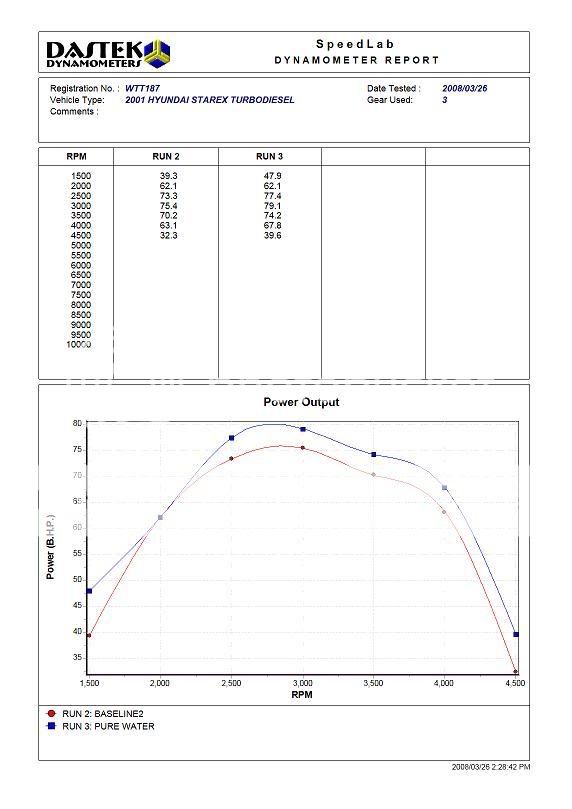
Note 30lbs or around 40nm tq that you have at activation of the system even with 100% water vs the stock. This is the pre-turbo injection benifit. Little turbo acting like a bigger more efficient turbo.
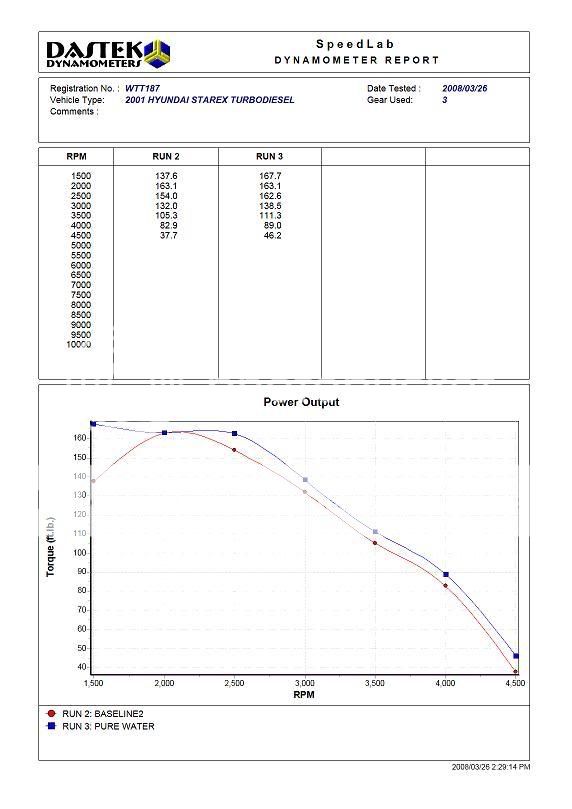
Here is a comparison of different activation points with 30/70 methanol /water..
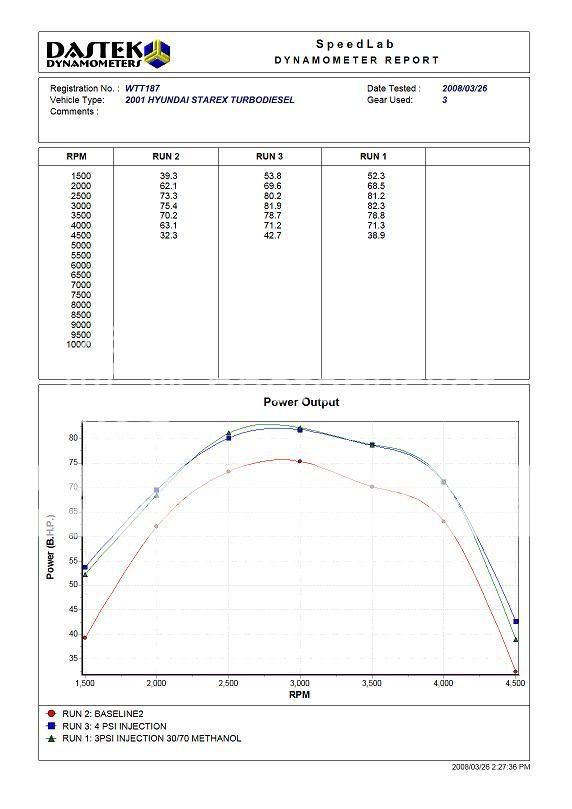
TQ numbers
Notice the 50lbs or 67nm improvement at 1500rpms and 38lbs or 51nm at 2500rpms.
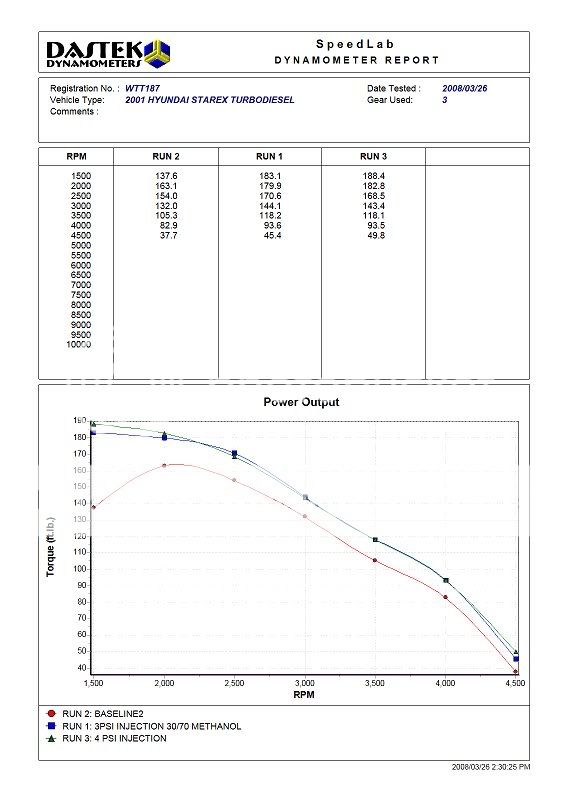
This is were we change it up to 50/50 mix, The methanol was already pre-mixed so we had to go with ethyl alcohol which I bought for 62P in a 500ml bottle. Gains will be higher with methanol because it has a higher octane number and better cooling.
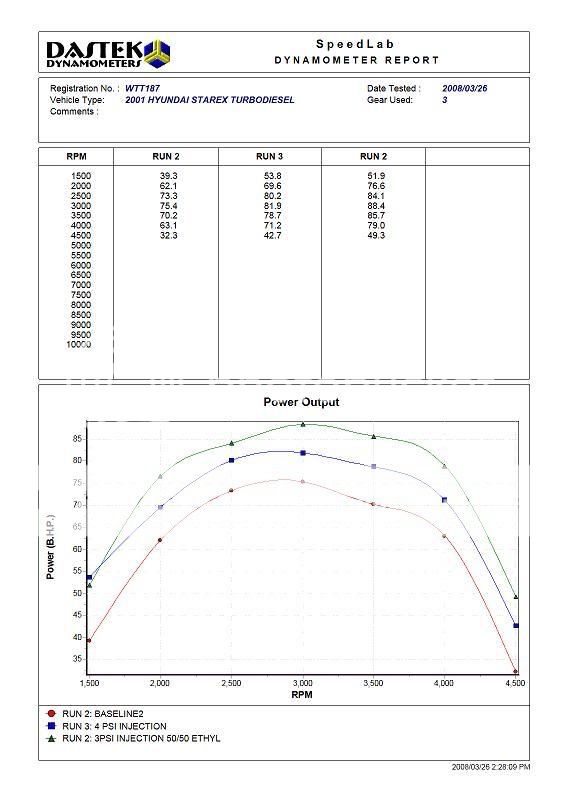
Once again 50lbs more TQ AT 1500rpm the turbo spools up instantly when the system starts to inject. The effect is instant torque at low RPM's.
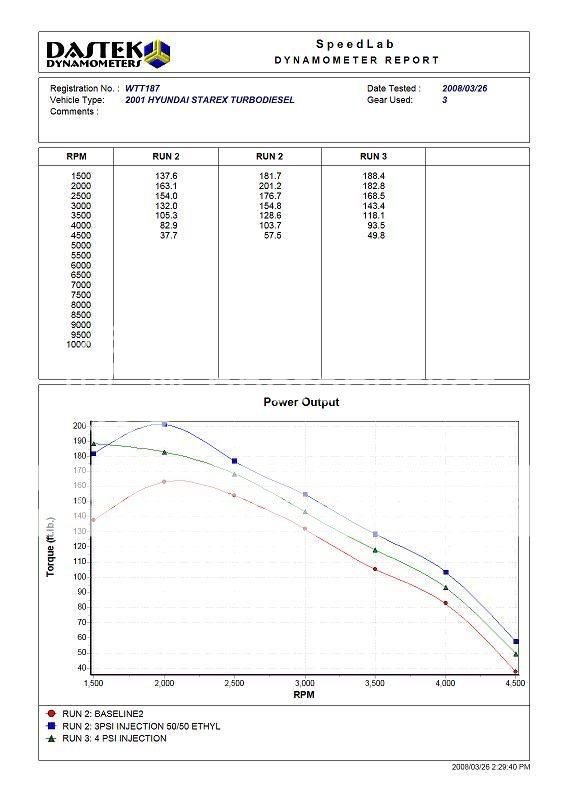
Bottom line 18% more power and 23.5% more torque on this pretty meager engine.
Diesel have 20% to 30% unburnt fuel even a ratio of 15% alcohol will significantly reduce your emissions by giving you a 100% burn and the extra power is just a bonus.
Here is a Mazda MPV that just installed the kit and the dyno results from last month.
Great results at 1500 to 3000rpm power and torque increases are great but the turbo does fall flat on it's face at around 3600rpms a pre-turbo nozzle would give you alot more gains in your top rpm range.
But look at the max gains.
1500 rpms 14hp TQ 47LBS Max HP Gain 43% Max TQ gain 46%
2000 rpms 32hp TQ 84LBS Max HP Gain 63% Max TQ gain 65% HUGE!!
2500 rpms 17hp TQ 36LBS MAX HP Gain 20% Max TQ gain 21%
3000 rpms 10hp TQ 19LBS MAX HP Gain 10% Max TQ gain 11%
To give you a ideal how well the system is working when you just look at the gains on just water alone it's enough to be impressed.
1500rpms 6.3hp gain- 20% over stock / TQ 22lbs 22% over stock
2000rpms 18hp gain - 36% over stock / TQ 47lbs 36% over stock
2500rpms 12.5hp gain- 15% over stock/ TQ 26lbs 15% over stock
3000rpms 6.9hp gain- 7% over stock/ TQ 12lbs 7% over stock
Even just using water give you good gains and if you want more power just add some alcohol to the mix and you got it. There is simply no modification for the money that can do this and all without changing anything about your engine. Even on pure water you get marked improvements in acceleration and fuel economy as well as reduced emissions.
As we stated before these vehicles have undersized turbos and the pre turbo injection signifiacatly helps them with the top end power Just compare the starex dyno. If he puts on a Pre turbo nozzle the power up to will be much greater.
All in all very impressive must be a blast to drive compared to stock.
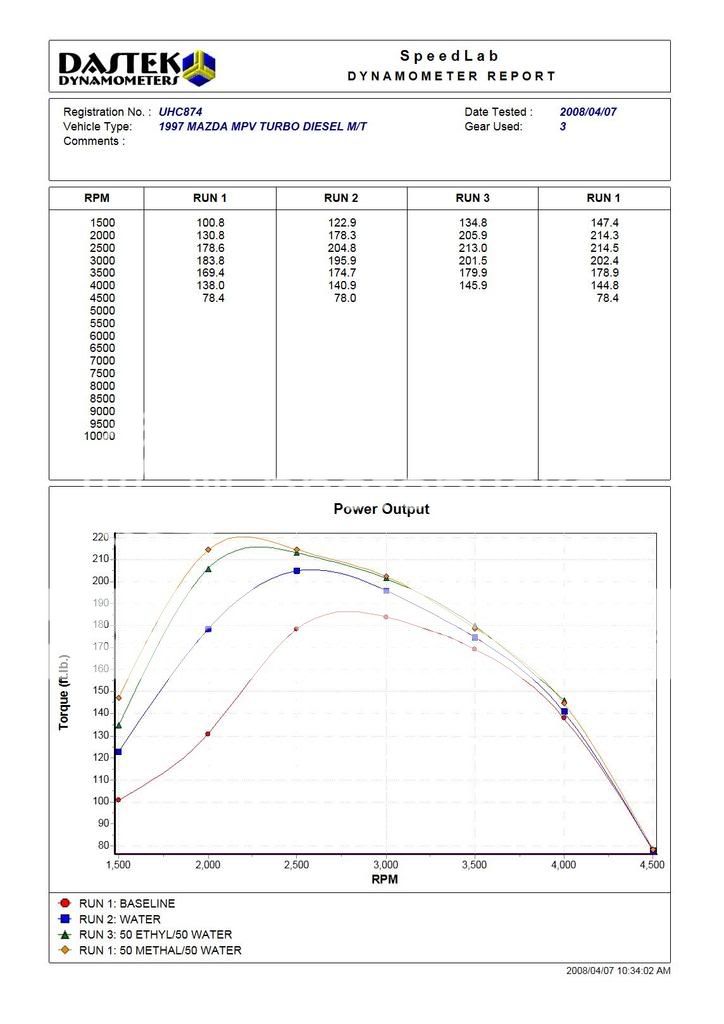
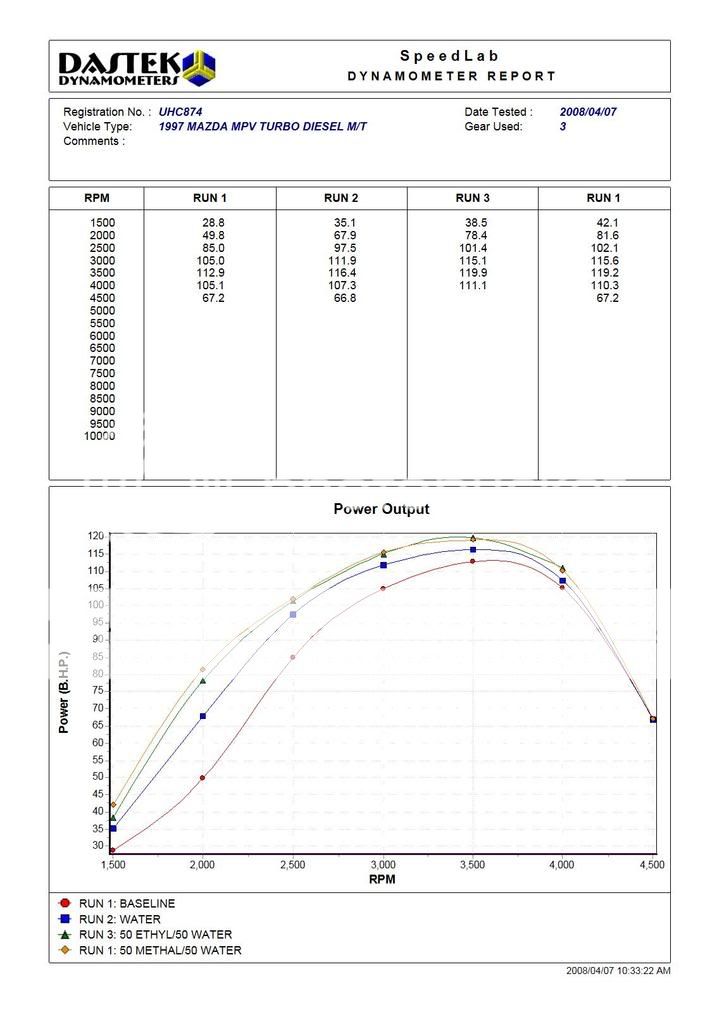
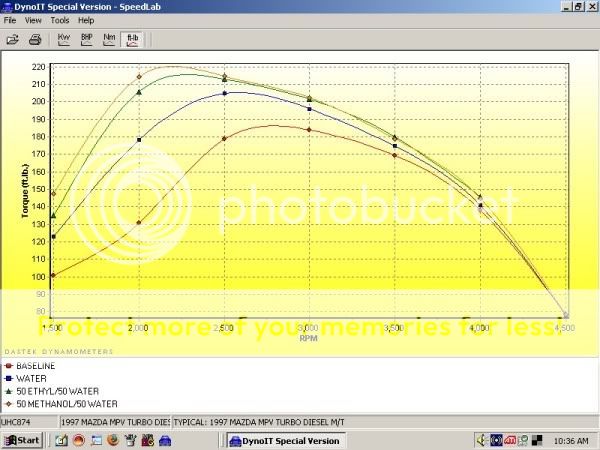
Just something to look into. If your chipped or remapped you will gain even more power and keep your EGT's down to a safe level which 780C is about the max sustained EGT's you want. High EGT's are a common problem on turbo diesels and can lead to engine and turbo failure.
• How does alcohol/water injection work?
By injecting a fine spray of alcohol/water into the inlet air stream of the engine, the charge air is dramatically cooled and the effective octane of the fuel is raised. Both help to eliminate detonation — the enemy of any engine, especially those using today's lower octane fuel under boost. For turbo diesel engine you will get a 100% fuel burn and on average pick up 20% to 30% more horse power over your RPM band. Turbocharged Gas engines will on average pick up 20% more horse power. You will notice immediate gains in performance. Your turbo will spool up faster, your top end will be noticeably improved and you will get no detonation.
What are the other benefits of alcohol injection?
1. Steam cleaned motor, alcohol injection will remove 95% of all carbon on the inside of your engine and keep it that way dramatic increase in engine life. There is no fuel additive on the market that can clean your engine as well. This means less maintaince , were talking almost zero carbon build up on plugs combustion chambers and valves!
2. Eliminate black smoke in turbo diesels by 95% under load.
3. Reduce emissions making a marked improvement in air quality.
4. More Kilometers per liter, more power at less throttle equal more liters per Kilometer.
5. Zero detonation
6. Intake air temperature reductions of up to 37C drop. You touch your intake it will be ice cold even on the hottest day after the system is on.
7. Reduction of Exhaust gas Temperatures as much as 93C, which increases horsepower and eliminates detonation especially on chipped vehicles with increased timming and boost.
Common question will injecting water/alcohol into my motor harm it, This is a complete myth water is produced in the combustion process in rather large amounts already. Methanol or whatever alcohol you choice to use is in vapor form inside the engine due to it's low boiling point. On diesels you can only go a max of 50/50 on the water/alcohol mix.
A alcohol/water injected motor will be free of about 95% of carbon buildup and stay that way as long as your using it.
Fact about water production in internal combustion engines.
Look something like this for each 100 gallons of gasoline burned diesels are similar.
90-120 gallons of water
3 to 10 gallons of unburned gasoline
½ to 2 pounds of soot
¼ to 1 pound of resins and varnishes
1 to 4 pounds of nitrogen and sulfur acids
6 to 10 ounces of insoluble lead salts (if leaded gasoline is used)
1 to 2 ounces of hydrochloric and hydrobromic acids.
If you don't believe it then feel free to look it up.
Now some dyno's these are both 2.5L engines mechanical pumps no electronics.
This vehicle is bone stock no modifications but a cold air intake. No boost controllers.
Guess what folks this is done with the factory intercooler completely by- passed. We completely ditched the factory intercooler, There is a DO1gph nozzle pre turbo which you can see from the charts the resutls of the instant spooling it provides even with 100% water the TQ off the line is impressive and a DO2gph nozzle at the intake to further cool things down.
Now a DO3gph nozzle at the intake would work just as well on most vehicles but this one struggled to make boost so we did pre-turbo which makes the little turbo act like a big one.
We did pulls with 30/70 methanol/water and then switch over to 50/50 denatured because the meth was already mixed at 30% gains probably would have been even greater with the methanol.
Note the mixture was 30/70 methanol/water if it is not stated on the dyno sheet. The other mix we use was 62P bottle of Ethly alcohol from the drug store 500ml and 500ml water for the 50/50 mix. The gains were larger
System activates at around 1400rpm on this 2001 Starex
BASE LINE VS 100% WATER

Note 30lbs or around 40nm tq that you have at activation of the system even with 100% water vs the stock. This is the pre-turbo injection benifit. Little turbo acting like a bigger more efficient turbo.

Here is a comparison of different activation points with 30/70 methanol /water..

TQ numbers
Notice the 50lbs or 67nm improvement at 1500rpms and 38lbs or 51nm at 2500rpms.

This is were we change it up to 50/50 mix, The methanol was already pre-mixed so we had to go with ethyl alcohol which I bought for 62P in a 500ml bottle. Gains will be higher with methanol because it has a higher octane number and better cooling.

Once again 50lbs more TQ AT 1500rpm the turbo spools up instantly when the system starts to inject. The effect is instant torque at low RPM's.

Bottom line 18% more power and 23.5% more torque on this pretty meager engine.
Diesel have 20% to 30% unburnt fuel even a ratio of 15% alcohol will significantly reduce your emissions by giving you a 100% burn and the extra power is just a bonus.
Here is a Mazda MPV that just installed the kit and the dyno results from last month.
Great results at 1500 to 3000rpm power and torque increases are great but the turbo does fall flat on it's face at around 3600rpms a pre-turbo nozzle would give you alot more gains in your top rpm range.
But look at the max gains.
1500 rpms 14hp TQ 47LBS Max HP Gain 43% Max TQ gain 46%
2000 rpms 32hp TQ 84LBS Max HP Gain 63% Max TQ gain 65% HUGE!!
2500 rpms 17hp TQ 36LBS MAX HP Gain 20% Max TQ gain 21%
3000 rpms 10hp TQ 19LBS MAX HP Gain 10% Max TQ gain 11%
To give you a ideal how well the system is working when you just look at the gains on just water alone it's enough to be impressed.
1500rpms 6.3hp gain- 20% over stock / TQ 22lbs 22% over stock
2000rpms 18hp gain - 36% over stock / TQ 47lbs 36% over stock
2500rpms 12.5hp gain- 15% over stock/ TQ 26lbs 15% over stock
3000rpms 6.9hp gain- 7% over stock/ TQ 12lbs 7% over stock
Even just using water give you good gains and if you want more power just add some alcohol to the mix and you got it. There is simply no modification for the money that can do this and all without changing anything about your engine. Even on pure water you get marked improvements in acceleration and fuel economy as well as reduced emissions.
As we stated before these vehicles have undersized turbos and the pre turbo injection signifiacatly helps them with the top end power Just compare the starex dyno. If he puts on a Pre turbo nozzle the power up to will be much greater.
All in all very impressive must be a blast to drive compared to stock.



Just something to look into. If your chipped or remapped you will gain even more power and keep your EGT's down to a safe level which 780C is about the max sustained EGT's you want. High EGT's are a common problem on turbo diesels and can lead to engine and turbo failure.


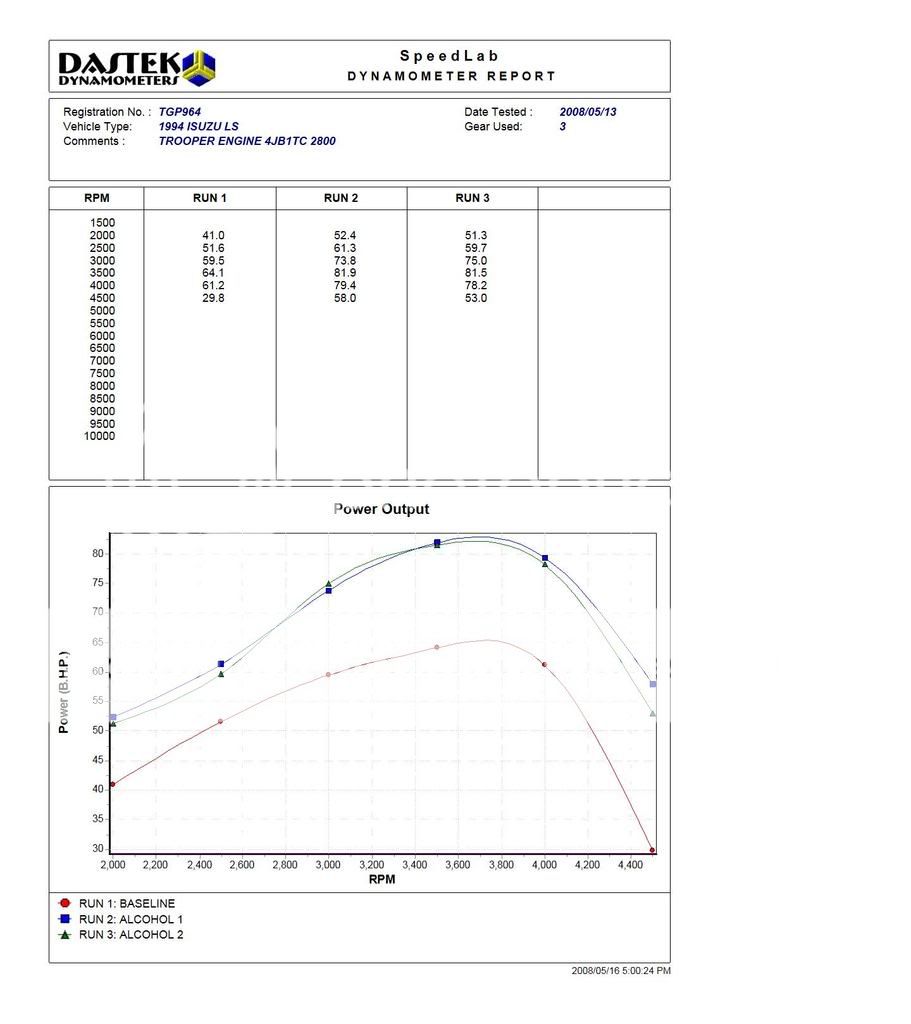
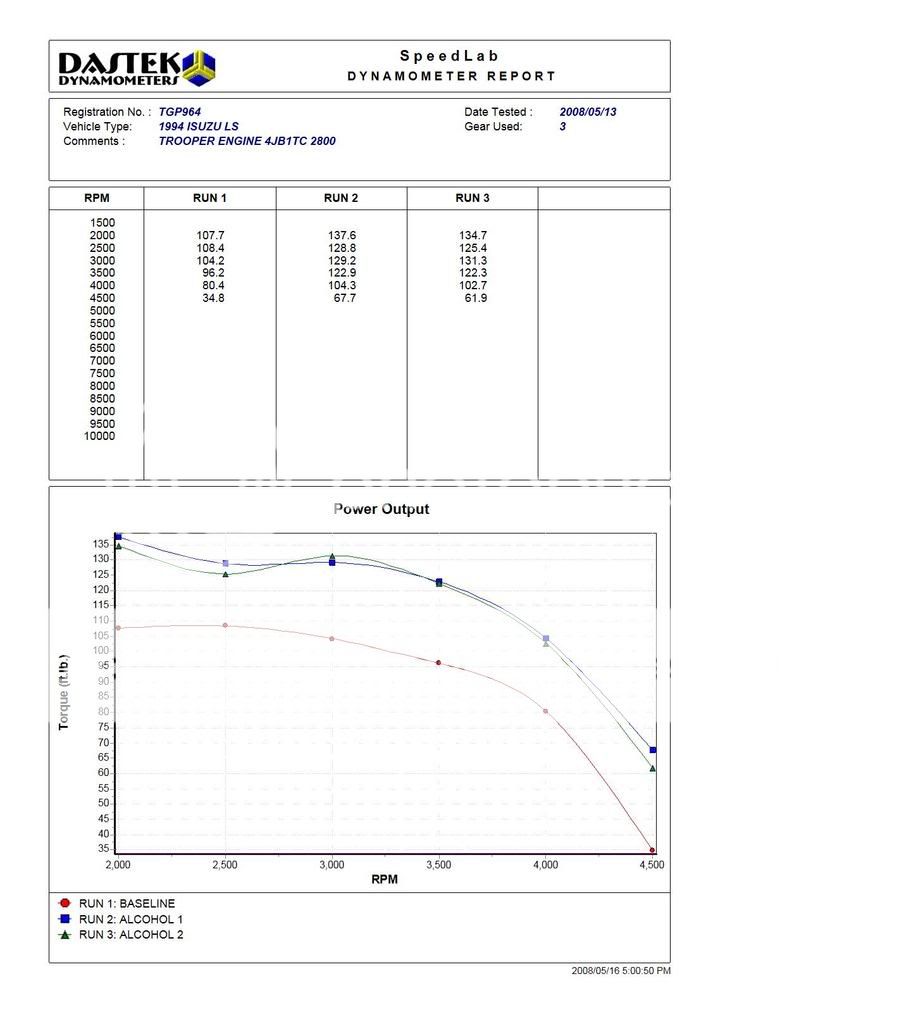
 Just make sure it's less than 50% per volume.
Just make sure it's less than 50% per volume.